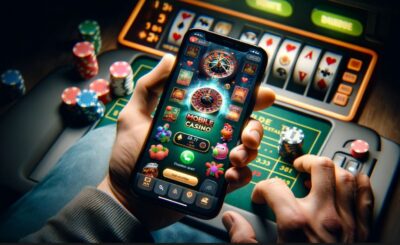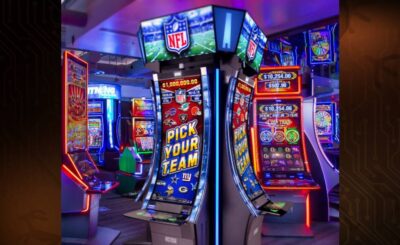Online casinos have come a long way since their inception, transforming from basic, text-based interfaces to the immersive, high-definition experiences we enjoy today. This evolution has been driven by rapid advancements in technology, which have continuously reshaped the online gambling landscape. In this blog, we’ll explore the journey of online casinos, from the early days of flash games to the cutting-edge live dealer experiences that are now standard, and we’ll take a look at what the future holds for this ever-evolving industry.
The Early Days: Flash Games and Simple Interfaces
When online casinos first appeared in the mid-1990s, they were a far cry from the sophisticated platforms we see today. Early online casino games were simple, relying on basic graphics and limited gameplay. These games were often built using Flash, a technology that allowed for the creation of animations and interactive content within a web browser.
Flash games were a significant step forward at the time, enabling players to enjoy a variety of casino games like slots, blackjack, and roulette from the comfort of their homes. However, these early games had their limitations. The graphics were rudimentary, the gameplay was often slow, and there were frequent compatibility issues, as not all browsers or devices supported Flash.
Despite these drawbacks, the novelty of being able to play casino games online was enough to attract a growing number of players. The convenience of playing from home, coupled with the excitement of real-money gaming, laid the foundation for the future of online casinos.
The Shift to HTML5 and Enhanced Gameplay
As technology advanced, so too did the capabilities of online casinos. The development of HTML5 marked a significant turning point in the industry. Unlike Flash, HTML5 is a versatile and powerful programming language that works across all modern web browsers and devices, including smartphones and tablets. This shift allowed for the creation of more complex and visually appealing games that could be played seamlessly across multiple platforms.
With HTML5, online casinos were able to offer faster load times, better graphics, and smoother gameplay. This technology also enabled the integration of more sophisticated features, such as multiplayer modes, leaderboards, and social gaming elements. The transition to HTML5 was a game-changer, making online casinos more accessible and enjoyable for a broader audience.
During this period, the rise of mobile gaming also played a crucial role in the evolution of online casinos. As smartphones and tablets became more powerful, players began to demand the ability to play their favourite casino games on the go. Online casinos responded by optimizing their platforms for mobile devices, offering a seamless experience that matched the quality of desktop gaming.
The Advent of Live Dealer Experiences
While HTML5 brought significant improvements to online casino games, the next major evolution came with the introduction of live dealer experiences. This innovation was driven by advancements in video streaming technology, which allowed online casinos to offer real-time, interactive gaming sessions with live dealers.
Live dealer games bridge the gap between the online and land-based casino experiences. Players can now interact with professional dealers in real-time, via high-definition video streams, while placing their bets from the comfort of their homes. Games like live blackjack, roulette, and baccarat have become immensely popular, offering an authentic casino atmosphere that was previously only available in physical venues.
The appeal of live dealer games lies in their ability to replicate the social aspects of gambling that many players enjoy. The ability to chat with the dealer and other players adds a layer of engagement that traditional online casino games often lack. For many players, this has become the preferred way to gamble online, offering the best of both worlds—convenience and authenticity.
The Impact of New Technologies
The evolution of online casinos has been fuelled by a range of technological advancements, many of which continue to shape the industry today. The widespread adoption of high-speed internet and the proliferation of powerful mobile devices have made it easier for players to access online casinos anytime, anywhere.
One of the most exciting developments in recent years has been the rise of virtual reality (VR) and augmented reality (AR) in online gaming. These technologies have the potential to take the online casino experience to new heights, offering fully immersive environments where players can interact with games and other players in ways that were previously unimaginable.
For example, a new online casino UK might offer a VR-powered poker room where players can sit at a virtual table, read their opponents’ body language, and engage in a truly interactive gaming experience. Similarly, AR could be used to overlay digital elements onto the physical world, allowing players to bring the casino into their living room.
Looking to the Future: What’s Next for Online Casinos?
The future of online casinos is bright, with continuous advancements in technology promising to deliver even more innovative and immersive experiences. As VR and AR become more mainstream, we can expect these technologies to play a larger role in online gambling, offering experiences that blur the line between virtual and real-world gaming.
Artificial intelligence (AI) is another area with significant potential. AI could be used to create more personalized gaming experiences, tailoring game recommendations, bonuses, and promotions to individual player preferences. Additionally, AI could enhance security measures, detecting and preventing fraudulent activity more effectively than ever before.
Blockchain technology is also making its way into the online casino industry, offering decentralized platforms that promise greater transparency, security, and fairness. With blockchain, players can have more confidence in the integrity of the games they play, knowing that outcomes are provably fair and their funds are secure.
Conclusion
The evolution of online casinos from basic flash games to live dealer experiences has been nothing short of remarkable. Technological advancements have driven this transformation, making online casinos more accessible, engaging, and authentic than ever before. As we look to the future, the possibilities for further innovation are endless, with VR, AR, AI, and blockchain all poised to play a significant role in shaping the next generation of online gambling.








